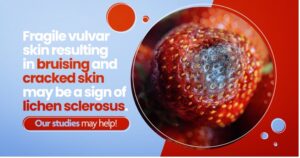Vulvar lichen sclerosus is something you don’t hear about every day, and it’s quite the mouthful. However, it’s essential to familiarize yourself with this condition’s facts. Let’s discuss lichen sclerosus; read our latest blog to learn about symptoms, causes, and potential treatment options!
What is Lichen Sclerosus?
It may not be fun to pronounce, but it’s even less fun to experience. Vulvar lichen sclerosus is a unique condition that should not be overlooked. This chronic inflammatory skin condition affects the vulva or external genitalia, causing thinning and wrinkling of the vulvar skin leads to varied symptoms of discomfort. It’s more common as we age but can affect anyone at any age, even young children. While the exact cause of vulvar lichen sclerosus is not fully understood, it is thought to be associated with other autoimmune conditions or related to changes in hormones. It is important to note that lichen sclerosus is not contagious and cannot be spread through sexual contact. While the condition remains incurable, proper management can significantly reduce unpleasant symptoms and help prevent further damage.
Recognize Symptoms – Minimize Risk
Symptoms for lichen sclerosus vary, but general signs to look out for are intense itching, thinning of vulval skin, and hard white patches. Other symptoms may include tearing of vulvar skin, blisters, soreness or burning, and minor bleeding after sexual intercourse or contact with clothing. As the triggering factor for lichen sclerosus remains unknown, it’s important to be aware of any signs to seek proper medical treatment.

If left untreated, this condition can lead to an array of risks. The erosion of vulvar tissue, thinning of vulvar structures, and vulvar bleeding/infection can even result in a higher risk of cancer. Routine medical checkups are necessary to detect vulvar lichen sclerosus. It’s important to do so early on before any severe symptoms increase the risk for further complications.
Lichen Sclerosus Treatment
When treating lichen sclerosus, a topical corticosteroid is the main treatment. Although, other anti-inflammatory medications could be options if symptoms are not well controlled on the steroid. Persistent treatment with a steroid, once to several times a week, is necessary to stop or slow progression of the disease. Talk to your doctor to find the option that is best for you. While these treatments are not guaranteed to cure lichen sclerosus, they can alleviate symptoms, slow progression, and minimize future complications. That’s why it’s vital to be proactive in seeking proper medical care if you suspect vulvar lichen sclerosus may be present.

Seattle Clinical Research Center can help you with your lichen sclerosus diagnosis – explore enrolling studies or contact us today at (206) 522 – 3330 extension 2 to learn more. Don’t wait for the discomfort; get ahead of it!
Resources:
https://www.yalemedicine.org/conditions/lichen-sclerosus
https://www.ncbi.nlm.nih.gov/pmc/articles/PMC3691475/
https://my.clevelandclinic.org/health/diseases/16564-lichen-sclerosus



